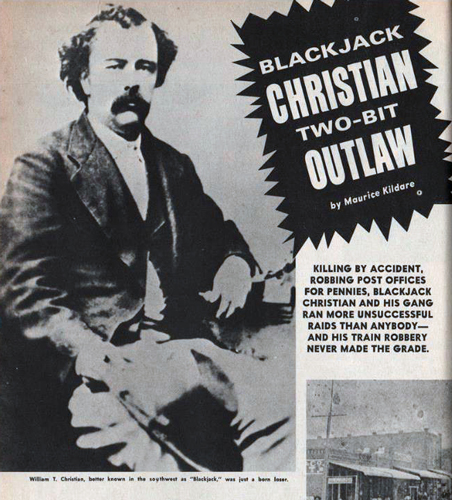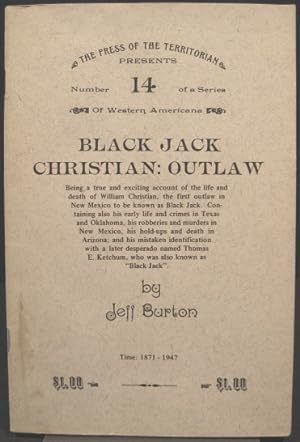
>
Echoes from the Frontier: Black Jack Christian and the Enduring Legends of America
The American landscape is not merely composed of mountains, rivers, and plains; it is also a vast tapestry woven from stories, myths, and legends. From the stoic figures of Native American lore to the industrious giants of the industrial age, these narratives form the bedrock of a nation’s identity, shaping how Americans perceive their past and themselves. Among the most potent of these myth-making crucibles is the American West – a frontier both geographic and symbolic, where the lines between law and lawlessness, hero and villain, often blurred into an intoxicating haze of folklore. It is in this crucible that figures like William "Black Jack" Christian, a relatively lesser-known outlaw compared to the likes of Jesse James or Billy the Kid, nonetheless etched his name into the annals of American legend, representing a fading era and the persistent allure of the untamed.
America, a relatively young nation, has a voracious appetite for self-mythologizing. Unlike older civilizations with centuries of documented history, the United States forged much of its identity through its westward expansion, a period brimming with extraordinary challenges and larger-than-life characters. Paul Bunyan, the colossal lumberjack, embodied the spirit of industrial might and man’s triumph over nature. Johnny Appleseed, the benevolent wanderer, symbolized the propagation of civilization and abundance. And John Henry, the steel-driving man, became the tragic hero of the industrial revolution, pitting human strength against the inexorable march of technology. These are the nation’s foundational fables, stories that teach us about perseverance, ingenuity, and the often-brutal cost of progress.

Yet, it is the Wild West that arguably holds the most captivating grip on the American imagination. It was a time of vast opportunity and equally vast peril, where society was still nascent, and justice was often dispensed at the barrel of a gun. The cowboy, the prospector, the saloon girl, the Native American warrior, the lawman, and the outlaw – these archetypes populate a narrative that speaks to core American values: rugged individualism, the pursuit of freedom, and the inherent tension between order and chaos. The frontier was a crucible where myths were forged, often exaggerated by dime novels and sensational newspaper accounts, creating a vibrant, if not always accurate, historical record. "The West," wrote historian Patricia Nelson Limerick, "was a place where people were free to reinvent themselves, to escape their pasts, and to embrace a new, often dangerous, identity." It was within this intoxicating environment that William "Black Jack" Christian found his stage.
Born William Christian in the Arizona Territory in 1871, Black Jack’s early life offered little indication of the violent path he would eventually tread. Like many young men on the frontier, he likely experienced the harsh realities of a life dependent on ranching and the unforgiving land. His transformation into an outlaw began in the mid-1890s, when he, along with his younger brother Bob and a small gang, began a spree of cattle rustling, stagecoach robberies, and train hold-ups across the Arizona Territory, New Mexico, and West Texas. This was a period when the vast, sparsely populated expanses of the Southwest offered perfect cover for those willing to live outside the law. Law enforcement was often thinly spread, making it difficult to track and apprehend well-mounted and determined gangs.
The Christian gang, while not achieving the widespread infamy of the James-Younger gang or the Wild Bunch, developed a reputation for their daring and ruthlessness. They were part of a lineage of outlaws who saw the burgeoning railroads and stagecoach lines as symbols of the encroaching establishment, ripe for plunder. Their targets were often isolated and vulnerable, and their methods efficient, if brutal. Accounts from the time describe Black Jack as a charismatic, yet utterly fearless leader, a man who commanded loyalty from his men and struck fear into the hearts of those they robbed. He wasn’t known for the romanticized "gentleman bandit" persona; rather, he was a pragmatic criminal focused on the take. His exploits, though localized, quickly became part of the regional lore, passed around campfires and in saloons, growing in the retelling.
The pursuit of the Christian gang became a priority for law enforcement across the territories. Their audacious robberies and the challenges they posed to the nascent structures of law and order could not be ignored. The task of bringing them to justice often fell to legendary figures themselves, men like George Scarborough, a Texas Ranger turned U.S. Deputy Marshal. Scarborough was a lawman cut from the same rugged cloth as the outlaws he pursued – fearless, relentless, and intimately familiar with the unforgiving terrain of the borderlands. His involvement elevated the hunt for Black Jack Christian from a mere criminal pursuit to a classic Wild West showdown.
The climax of Black Jack Christian’s career, and life, came in April 1897. After a string of robberies, the gang was tracked by Scarborough and his posse to a desolate area known as Devil’s Canyon, near the New Mexico/Arizona border. It was here, in the stark, unforgiving landscape that had for so long provided sanctuary, that Black Jack Christian met his end. The ensuing gunfight was short, brutal, and decisive. Ambushed by Scarborough’s men, Christian was killed in the exchange of gunfire. His younger brother, Bob, was wounded but managed to escape, only to be killed in a later encounter. The death of Black Jack Christian effectively broke the gang, scattering its remaining members and signaling the end of an era for this particular brand of frontier banditry.
Black Jack Christian’s story, while less celebrated than some of his outlaw contemporaries, serves as a powerful case study in the American myth-making process. Was he truly a "black jack" – a wild, untamable card in the deck of fate – or simply a desperate criminal operating in a lawless time? The truth likely lies somewhere in between. Dime novels and local newspapers, always eager for a sensational story, would have certainly embellished his exploits, transforming a regional bandit into a figure of legend. He became, in many ways, a symbol of the "last of the breed" – an outlaw whose existence was threatened by the closing frontier, the arrival of more organized law enforcement, and the steady march of "civilization." His death, at the hands of a renowned lawman like Scarborough, neatly encapsulates the struggle between the old, wild ways and the new order.
Comparing him to figures like Billy the Kid or Jesse James, Black Jack Christian might lack the romanticized sheen or the perception of being a "man of the people" that sometimes attached to those outlaws. He was a simpler, more direct outlaw, a product of his immediate environment. Yet, his story resonates because it embodies the fundamental tension that defines so much of the American narrative: the clash between individual liberty and societal control, between the lure of the wilderness and the demands of settled life. These are the themes that continue to draw audiences to Western films, novels, and historical accounts. As one historian observed, "Outlaws were often viewed as anti-heroes, challenging authority in a land where authority was often distant and corrupt, making their defiance strangely appealing."
The legends of America, whether they feature colossal lumberjacks or notorious outlaws, are more than mere historical footnotes. They are cultural touchstones that reveal much about the nation’s character and aspirations. They are stories of ambition, struggle, and resilience, often set against the backdrop of a vast and challenging landscape. Black Jack Christian, with his brief but impactful reign of terror and his dramatic end, reminds us that the American frontier was a place where fortunes were made and lost, where heroes and villains were often separated by a thin, shifting line, and where the echoes of gunfire and daring deeds continue to resonate in the collective memory, forever shaping the enduring legend of America. The frontier may have closed, but its stories, like the winds across the vast Western plains, continue to blow, whispering tales of those who lived and died by its rugged code.



